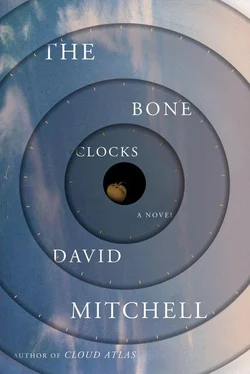Then I remember Miss Constantin and King’s College Chapel. What if she caused my zone-out — like Pfenninger just did?
“We hiatused you, Mr. Anyder,” says Pfenninger, “to search you for stowaways. It’s intrusive, but we can’t be too careful.”
If that makes sense to him or to D’Arnoq, it makes none to me. “I don’t have a clue what you’re talking about.”
“I’d be worried if you did, at this stage.”
I touch my head for signs of damage. “How long was I under?”
Pfenninger produces a copy of Die Zeit and hands it to me. On the front page Helmut Kohl is shaking hands with the Sheikh of Saudi Arabia. So what? Don’t tell me the German chancellor is mixed up in this. “The date , Mr. Anyder. Examine the date.”
There, under the masthead: 4. Januar 1992 .
Which cannot be right: today is 2 January 1992.
Pfenninger told me to remember it, in the car. Just now.
Just now. Yet still Die Zeit insists today is 4 January 1992.
I feel like I’m falling. Unconscious for two days? No, it’s more likely the newspaper’s a fake. I rustle through its pages, desperate to find evidence that things aren’t what they appear to be.
“It could be a fake,” Pfenninger concedes, “but why construct a falsehood that could be readily demolished?”
I’m head-smashed and, I realize, ravenously hungry. I check my stubble. I shaved this morning, at Holly’s. It’s grown. I stagger back, afraid of Elijah D’Arnoq and this Mr. Pfenninger, these … paranormal … Whateverthefuck they are, I have to get away to — to …
… to where? Our tracks in the snow disappear around a bend. Maybe there’s a car park with a visitor’s center and telephones just out of sight, or maybe it’s thirty kilometers of glacier and crevasses. Back the other way, the narrow mountain shelf on which we stand narrows to a stubborn clump of firs, then it’s near-vertical ice and rock. Pfenninger is studying me, while D’Arnoq is pouring a lumpy liquid into the Thermos cup. I want to scream, “A picnic?” I squeeze the sides of my skull. Get a grip and calm down. It’s late in the afternoon. Clouds are smeared across the sky, beginning to turn metallic. My watch — I left it in Holly’s bathroom. I walk to the low wall, a few paces from Pfenninger, and the ground swoops down fifty meters to a road. There’s an ugly modern bridge over a deep crevasse, and a road sign that I can’t read at this range. The road climbs to the bridge from half a kilometer away, twisting up from slopes dunked in shadow. Beyond the bridge, the road disappears behind a shoulder of the mountain we stand on, near a glassy waterfall that textures the profound silence. Us, the sign, the bridge, and the road surface: there are no other signs of the twentieth century. I ask, “Why did you bring me here?”
“It seems apt,” says Pfenninger, “since we’re in Switzerland, anyway. But first line your stomach: You’ve eaten nothing since Tuesday.” D’Arnoq’s next to me with a steaming cup. I smell chicken and sage and my stomach groans. “Don’t burn your tongue.”
I blow on it and sip it cautiously. It’s good. “Thanks.”
“I’ll let you have the recipe.”
“Being moved under hiatus is a double hand grenade in the brain, but”—Pfenninger clears the snow off the low wall and motions for me to sit down next to him—“a quarantine period was necessary before we let you into our realm. You’ve been in a chalet near Oberwald since noon of the second, not far from here, and we brought you here this morning. This peak is Galmihorn; that one is Leckihorn; over there, we have Sidelhorn.”
I ask him, “Are you from here, Mr. Pfenninger?”
Pfenninger watches me. “The same canton. I was born in Martigny, in 1758. Yes, 1758 . I trained as an engineer, and in spring 1799, in the employ of the Helvetica Republic, I came here to oversee repairs to an ancestor of that bridge, spanning the chasm below.”
Now, if Pfenninger believes that, he’s insane. I turn to D’Arnoq, hoping for supportive sanity.
“Born in 1897, me,” says D’Arnoq, drolly, “as a very far-flung subject of Queen Victoria, in a stone-and-turf house out on Pitt Island — three hundred klicks east of New Zealand. Aged eighteen, I went on the sheep boat to Christchurch with my cousin. First time on the mainland, first time in a brothel, and first time in a recruiting office. Signed up for the Anzacs — it was either foreign adventures for king and empire or sixty years of sheep, rain, and incest on Pitt Island. I arrived in Gallipoli, and you know your history, so you’ll know what was waiting for me there. Mr. Pfenninger found me in a hospital outside Lyme Regis, after the war. I became an Anchorite at twenty-eight, hence my eternal boyish good looks. But I’m ninety-four years old next week. So, hey. The lunatics have you surrounded, Lamb.”
I look at Pfenninger. At D’Arnoq. At Pfenninger. The telepathy, the hiatuses, and the Yeti merely ask me to redefine what the mind can do, but this claim violates a more fundamental law. “Are you saying—”
“Yes,” says Pfenninger.
“That Anchorites—”
“Yes,” says D’Arnoq.
“Don’t die?”
“No,” frowns Pfenninger. “Of course we die — if we’re attacked, or in accidents. But what we don’t do is age. Anatomically, anyway.”
I look away at the waterfall. They’re mad, or liars, or — most disturbing of all — neither. My head’s too hot so I remove my hat. Something’s cutting into my wrist — Holly’s thin black hair-band. I take it off. “Gentlemen,” I address the view, “I have no idea what to think or say.”
“Far wiser,” says Pfenninger, “to defer judgement than rush to the wrong one. “Let us show you the Dusk Chapel.”
I look around for another building. “Where is it?”
“Not far,” says Pfenninger. “See that broken archway? Watch.”
Elijah D’Arnoq notices my anxiety. “We won’t put you to sleep again. Scout’s honor.”
The broken archway frames a view of a pine tree, virgin snowy ground, and a steep rock face. Moments hop by, birdlike. The sky’s blue as a high note and the mountains nearly transparent. Hear the waterfall’s skiff, spatter, and rumble. I glance at D’Arnoq, whose eyes are fixed where mine should be. “Watch.” So I obey, and notice an optical illusion. The view through the archway begins to sway, as if it were only printed on a drape, caught by a breeze, and now pulled aside by an elegant white hand in a trim Prussian-blue sleeve. Miss Constantin, bone-white and golden, looks out, flinching at the sudden bright cold. “The Aperture,” murmurs Elijah D’Arnoq. “Ours.”
I surrender. Portals appear in thin air. People have pause buttons. Telepathy is as real as telephones.
The impossible is negotiable.
What is possible is malleable.
Miss Constantin asks me, “Are you joining us, Mr. Anyder?”

“IF YOU’RE ASKING whether I’m a war junkie,” I tell Brendan, “then the answer’s no, I am not.” I sound pissed off. I am, I suppose.
“Not you , Ed!” My virtual brother-in-law disguises his backped-aling behind a Tony Blairish suavity. Brendan looks like, and is, a workaholic property developer in his midforties having a rare weekend off. “We know you aren’t a war junkie. Obviously. I mean, you flew all the way back to England for Sharon’s wedding. No, I was only asking if it ever happens that a war reporter gets sort of hooked on the adrenaline of life in war zones. That’s all.”
Читать дальше













